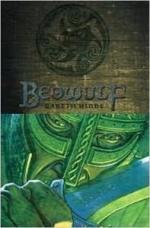Plate-gold and fretwork; not far was it thence
To go off in search of the giver of jewels:
[66] Hrethel’s son Higelac at home there remaineth,[4]
35 Himself with his comrades close to the sea-coast.
The building was splendid, the king heroic,
Great in his hall, Hygd very young was,
{Hygd, the noble queen of Higelac, lavish of gifts.}
Fine-mooded,
clever, though few were the winters
That
the daughter of Haereth had dwelt in the borough;
40 But she
nowise was cringing nor niggard of presents,
Of
ornaments rare, to the race of the Geatmen.
{Offa’s consort, Thrytho, is contrasted with Hygd.}
Thrytho
nursed anger, excellent[5] folk-queen,
Hot-burning
hatred: no hero whatever
’Mong
household companions, her husband excepted
{She is a terror to all save her husband.}
45 Dared
to adventure to look at the woman
With
eyes in the daytime;[6] but he knew that death-chains
Hand-wreathed
were wrought him: early thereafter,
When
the hand-strife was over, edges were ready,
That
fierce-raging sword-point had to force a decision,
50 Murder-bale
show. Such no womanly custom
For
a lady to practise, though lovely her person,
That
a weaver-of-peace, on pretence of anger
A
beloved liegeman of life should deprive.
Soothly
this hindered Heming’s kinsman;
55 Other
ale-drinking earlmen asserted
That
fearful folk-sorrows fewer she wrought them,
Treacherous
doings, since first she was given
Adorned
with gold to the war-hero youthful,
For
her origin honored, when Offa’s great palace
60 O’er
the fallow flood by her father’s instructions
She
sought on her journey, where she afterwards fully,
Famed
for her virtue, her fate on the king’s-seat
[67] Enjoyed in her lifetime, love did she hold
with
The
ruler of heroes, the best, it is told me,
65 Of all
of the earthmen that oceans encompass,
Of
earl-kindreds endless; hence Offa was famous
Far
and widely, by gifts and by battles,
Spear-valiant
hero; the home of his fathers
He
governed with wisdom, whence Eomaer did issue
70 For help
unto heroes, Heming’s kinsman,
Grandson
of Garmund, great in encounters.
[1] For ‘scawan’
(1896), ‘scaethan’ has been proposed.
Accepting this,
we may render: He
said the bright-armored warriors were going to
their vessel, welcome, etc.
(Cf. 1804.)




